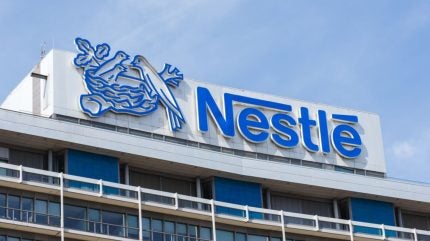

Nestlé is expanding a plant in Germany dedicated to the manufacture of products for congenital metabolic disorders.
The world’s largest food company broke ground on the project last week and expects to complete building work at the Rosbach vor der Höhe site north of Frankfurt in the spring of next year.
Rosbach vor der Höhe houses Nestlé’s Vitaflo business, which produces the brands Mevalia and Comidamed. Vitaflo, set up in the UK city of Liverpool in 1997 before expanding into Germany in 2007, sits within the Nestlé Health Science division.
Nestlé said the brands Mevalia and Comidamed were acquired by Vitaflo in 2021 and the business employs more than 300 people supplying in excess of 40 countries. More than €8m ($8.6m) is being invested at the Rosbach vor der Höhe facility “to expand and modernise production”.
Production volumes will increase and jobs will be created from the expansion project. Just Food has asked Nestlé for specific details.
Nestlé CEO for Germany, Alexander von Maillot, said in a statement: “By investing in innovations and using cutting-edge technology, Vitaflo provides pioneering nutritional therapies with clinical, health-economic value in order to improve the quality of life of those affected.
Access the most comprehensive Company Profiles
on the market, powered by GlobalData. Save hours of research. Gain competitive edge.

Company Profile – free
sample
Your download email will arrive shortly
We are confident about the
unique
quality of our Company Profiles. However, we want you to make the most
beneficial
decision for your business, so we offer a free sample that you can download by
submitting the below form
By GlobalData
“This is just as important an area of work for us as our classic products from the food retail trade.”
The company described the Mevalia and Comidamed brands as “speciality” and “dietary foods” designed to “improve the lives of people with rare, congenital protein metabolism disorders” such as phenylketonuria. The products are usually prescribed by a doctor, Nestlé said.
It added that one in around 10,000 newborns in Germany is affected by the phenylketonuria disease, requiring a “lifelong adherence to a protein-modified diet”.
David Jobse, the managing director of Vitaflo in Germany, said: “Today we are facing the next milestones in the history of our company. The investment in the factory renovation enables us to continue to produce according to the highest quality standards.
“We already export our products to many countries around the world. In the future, we will be even more competitive by always being able to meet the growing demand.”
Sales generated from the Nestlé Health Science division amounted to SFr6.5bn ($7.2bn) in fiscal 2023, compared to SFr93bn for the company as a whole.
Real internal growth (RIG), a key Nestlé performance metric, dropped 3.2% last year for the business unit versus a 0.3% decline at the group level. Organic growth was 1.6%, less than the 7.2% for the entire business.

